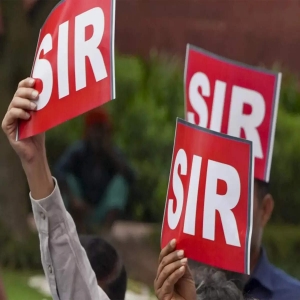
.png) Joseph Maliakan
Joseph Maliakan
.jpg)
In a significant boost to democratic principles, the Supreme Court on Thusday, August 14, 2025 in an interim order directed the Election Commission of India to publish the boothwise list of more than 65 lakh voters whose names have been deleted following the Special Intensive Revision (SIR) carried out in Bihar where Assembly election is due early next year.
An SC bench comprising Justices Surya Kant and Joymalya Bagchi ordered that the list must be comprehensive by giving the reason for the deletion in every case, death, migration, untraceability or duplicate registration.
The order came on a bunch of petitions filed by the Association for Democratic Rights (ADR) Peoples Union for Civil Liberties (PUCL), Trinamool Congress Party Member of Parliament (MP) Mahua Moitra, Rashtriya Janata Dal MP Manoj Jha, Congress Party leaders KC Venugopal and Mujahid Alam challenging the constitutional validity of the SIR of the voters list in Bihar.
The court, through Thursday's order, has reiterated voters' "right to know" and upheld the citizens' constitutional right to be included in the electoral roll maintained by the ECI.
In this context, Justice Bagchi said, "People have a right to know. A high degree of transparency is required to inspire voters' confidence. Put up the names of excluded Elector's with reasons out there in the public domain for all to see."
"If according to you, 22 lakh of the 65 lakh voters are dead, why are their names not being disclosed? There is a narrative doing the rounds that family members do not know their kin have been left out as dead in the draft roll. If you put out the names in the public domain that narrative disappears... In short, we want a 'Poonam Devi's' family in Bihar to know that her name has been deleted because she is dead," Justice Kant observed.
Out of 7.89 crore registered voters in Bihar, 65 lakh voters' names were deleted during the hastily carried out SIR, following a summary revision in January 2025. The court ordered the ECI to publish the deleted voters' list with reasons on the websites of the District Electoral Officers (DEOs) across Bihar. Physical lists have to be displayed on the notice boards of the Booth Level Officers (BLOs) block development or Panchayat offices to facilitate manual access.
The SC also ordered the ECI to provide the Bihar Chief Electoral Officer with soft copies of the list to be displayed on his website. The Commission also has to give wide publicity by issuing "layman friendly" public notice in vernacular and English newspapers on radio, TV and authorised social media platforms about the publication of the list.
Justice Kant said even if a migrant worker's name has been deleted as dead, once the list is published, his or her neighbour or friends would alert the voter. It is only fair to have a procedure that does not block a person from exercising the right to universal adult franchise.
The Supreme Court further ordered the Election Commission to accept Aadhaar as proof of identity and residence. Aggrieved voters whose names have been left out of the SIR could file their objections by applying with a copy of the Aadhar.
"Aadhar is a statutorily recognised instrument of identity and residence. It can be submitted as a document," Justice Bagchi said. This observation is very important because so far the Commission has refused to accept Aadhaar to enrol oneself as a voter.
The Commission, the order said, would compile proof of compliance from BLOs and DEOs and place on record a collated status report on August 22, the next date of hearing of the matter. The list and reasons should be searchable by giving the EPIC number of the voter concerned.
The court, in a very significant observation, stressed that the voters' right to know about the addition or deletion of their constitutional right to be included in the electoral roll cannot be dependent on agents of political parties or booth-level officers.
The way the Commission do the intensive revision has to be comfortable for the voters and should not create any strain, Justice Bagchi pointed out. And voters should not be dependent on the will and convenience of the BLOs to know why their names have been deleted from the electoral roll.
If the names and reasons for deletion are displayed, it would minimise manual interventions. People should not be dependent on political workers who have their own vested interests..Voters must have the right to check their status on the electoral roll without recourse to either BLAs or BLOs, Justice Kant observed.